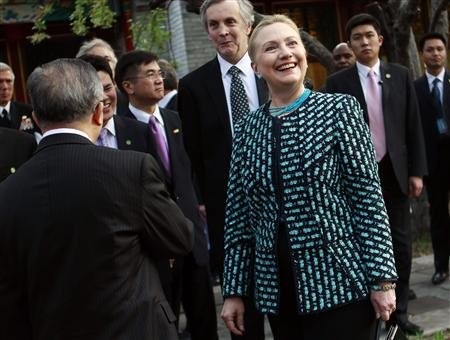(VOVworld) - China and the US today/Thursday began their 4th strategic and economic dialogue, one of the most important event in Sino-US relations. Scheduled for 2 days, the dialogue is expected to untie knots in relations between the world’s two largest economies. But analysts say this won’t be an easy task as both countries will cling to two their own strategic benefit. Thu Van has more….
Vice-Premier Wang Qishan and State Councilor Dai Bingguo on Thursday joined US Secretary of State Hillary Clinton and Treasury Secretary Timothy Geithner in co-chairing the annual double-channel dialogue on macroeconomic policies and major international issues. Although lasting only 2 days, the meeting is expected to significantly affect the development of the US-Sino relationship. According to statements released by both sides, this dialogue turns around some big problems, both political and economic. Regarding the political issues, Chinese Deputy Foreign Minister Cui Tiankai said they will discuss strategic security issues, climate change, energy security, and pressing issues in Sudan and South Asia. Developments on the Korean peninsular and in Syria, China’s oil imports from Iran, and maritime security in the East Sea will also be raised by the US during this dialogue. In terms of economics, Sino and US leaders will discuss measures to boost sustainable and balanced economic growth, financial policy, and currency prospects in each country, expand trade and investment opportunities, and reform the financial market. Chinese Vice Minister for Finance Zhang Shaochun also revealed that the two will resume negotiations on a bilateral investment treaty within the dialogue.
 |
| US Secretary of State Hillary Clinton arrived in Beijing on May 2nd to attend the dialogue |
Before the dialogue, which has received huge public attention, US politicians voiced optimism about the US-Sino relationship. Treasury Secretary Geithner said China is the only country in the world that possesses such huge interwoven challenges and opportunities. US business CEOs consider this dialogue a golden opportunity for China to renovate its investment environment. US-China Business Council President John Frisbie says US firms hope China will agree to open up discussions on a bilateral investment treaty which would allow US businesses to own Chinese companies.
In addition to positive expectations, the dialogue also faces significant challenges threatening its success. Ahead of the dialogue, the US urged China to reform its financial sector to create a level playing field for both economies, with a focus on the Chinese yuan. Mr. Geithner says China’s recent adjustment of its foreign exchange rate is not enough. Analysts agree that Geither is wise to make the yuan a top issue of this dialogue for the following reasons. First, the US trade deficit is multilateral. In 2010, the US had trade deficits with 88 countries. Second, the yuan has risen 31.4% in comparison with the USD since 2005. About 60% of Chinese goods exported to the US are from Chinese companies with foreign invested capital. It is the globalization of production that affects US-Sino trade, not the foreign exchange rate.
In the international arena, there remain concerning signals that could affect the dialogue results. US Secretary of State Hillary Clinton visited the Philippines and India, both involved in disputes with China, before heading to Beijing to attend the dialogue. Also, the second Sino-US Security Strategic Dialogue that ended on Wednesday in Beijing achieved little positive result. The two sides only agreed to develop their strategic security dialogue mechanism and help this mechanism play a greater role in enhancing bilateral strategic trust.
Thu Van